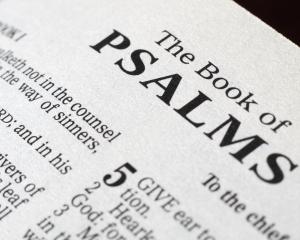In a time of transition, is the timidity of the clergy killing the church? asks Ian Harris. Where does loyalty lie?
Why do so many ministers, retiring after a lifetime of service to their church, hardly ever go to church again?
Not, usually, because they've lost their faith. Rather, they've come to feel out of sync with what they see happening there.
Many lay people feel the same way.
After loyally playing their part for years in parish life, they wake up one morning and ask themselves: "What exactly am I being loyal to? The church as an institution? A denominational heritage? A family tradition? The people of my parish? The minister or priest? The example of Jesus? Christ of the creeds?''
All of these are worthy, but there's a deep-down dissonance.
The pieces don't fit together as neatly as before.
They don't find church-going the energising, focusing, deepening experience it used to be.
They hang on by their fingernails as long as they can ... and then drop out.
This malaise has been happening across denominations for decades.
Auckland Catholic Bishop Patrick Dunn last month highlighted the steady defection of New Zealand-born Christians as the "Kiwi drift''.
One used to hear people say they were subjected to so much religion while growing up that they were happy to break free of it as soon as they could.
Winston Churchill was one such person. He tells how at Harrow he attended three services every Sunday, plus morning and evening prayers through the week: "I accumulated in those years so fine a surplus in the Bank of Observance that I have been drawing confidently upon it ever since.''
That is not happening so much today, simply because so many parents decide not to introduce their children to church at all.
Perhaps a reaction will set in one day when, as adults, a curious new generation begins to wonder what they have been deprived of.
And perhaps not.
One major reason for the "Kiwi drift'' is the churches' failure to allow Christian faith to evolve in a changing world.
They have clung to creeds, doctrines and practices that made excellent sense in light of the knowledge of former times, but which are crying out for a thorough-going reinterpretation in our 21st-century world.
I have had many letters reflecting that.
After lifelong membership in her church, one woman writes: "What a pity the churches have kept silent and denied Christian people access to the thinking of modern scholarship. And how much pain its devotees could be spared as they are left to ponder their own apparently heretical views.''
Another, in her 80s and still attending church: "My faith journey has brought me to a place of questioning the dogma of the church ... Sometimes it seems as though my efforts at finding a meaningful belief put me out on a limb, but now I realise that I am not alone.''
Their comments echo the views of ministers whose reading and thinking have taken them far from the point where their journey began.
Together they are part of a far-reaching transition that is occurring within Christian thought, but not so much in regular church life - often the reverse as leaders dig in to resist substantive change.
Sometimes it is clergy who hold the church back.
At the Napier Progressive Spirituality Conference in May, American United Church of Christ pastor Dr Robin Meyers declared bluntly: "The timidity of the clergy is killing the church.''
Usually it is pastoral concern that deters them from offering contemporary insights on the Bible and faith, even when they would like to.
But silence leaves people who would be open to such insights in limbo.
Sometimes it is lay people who block progressive alternatives, believing any change to ancient formulations would be a sell-out.
There could be some truth in the prediction that the last seven words of the church will be: "We've never done it like that before.''
For me, the future of Christian faith does not depend on loyally keeping fossils warm, whether fossils of creed, doctrine, church order, or anything else.
It hinges rather on identifying what is core to our Judaeo-Christian heritage, and then working out how people at home in the modern world can relate to it and express it honestly in terms of today.
Which happens to be just what Christians of the 4th, 12th, 16th and other centuries did in and for their own times.
That would unquestionably be loyalty - but loyalty to the Judaeo-Christian core and the quintessential religious process, rather than to interpretations which, in our secular understanding, are no longer tenable.
Let the transition roll on!
- Ian Harris is a journalist and commentator.












